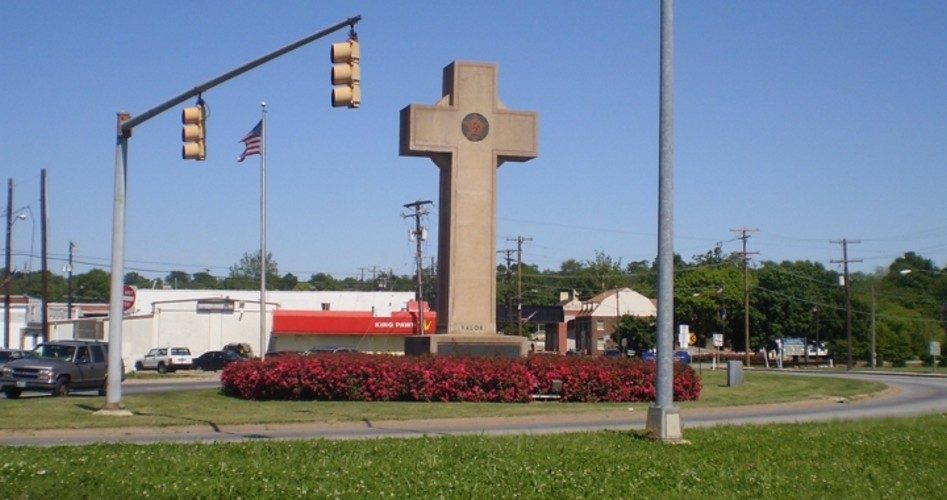
The Supreme Court will hear arguments in a landmark case February 27 that could impact countless crosses on federally held lands such as Arlington National Cemetery. The High Court will take up the case of the “Peace Cross” (shown), a 40-foot-tall memorial in Bladensburg, Maryland, erected in 1925 by the American Legion to memorialize the 49 soldiers from Prince George’s County who died during World War I. In 1961, the American Legion turned over the monument and the land on which it is located to the state of Maryland, which has maintained it ever since.
By 2014, the monument was on the radar of the secularist American Humanist Association (AHA), which filed suit to have it removed, charging that the memorial represents a violation of the First Amendment’s supposed separation of religion and government requirement.
In 2015, Maryland’s U.S. District Court ruled that the memorial could remain, finding that despite its cross shape, the purpose of the monument was not primarily religious and thus was not in violation of the First Amendment’s “separation” clause.
But in 2017, a three-judge panel of the U.S. Court of Appeals for the 4th Circuit overturned the lower court, ruling 2-1 that the memorial amounts to an unacceptable endorsement of Christianity. “The Latin cross is the core symbol of Christianity,” opined Judge Stephanie Thacker in the majority opinion. “And here, it is 40 feet tall, prominently displayed in the center of one of the busiest intersections in Prince George’s County, Maryland, and maintained with thousands of dollars in government funds.”
The American Legion subsequently appealed to the Supreme Court, warning that the 4th Circuit’s ruling could jeopardize countless similar cross-shaped war memorials, such as the 24-foot Canadian Cross of Sacrifice and the 13-foot Argonne Cross, both which have stood in Arlington National Cemetery for generations. “No other court has gone so far as to hold that a longstanding, historical war memorial that was built to be a war memorial and has only ever been a war memorial was unconstitutional,” argued the American Legion in its petition to the High Court, “merely because its private builders chose to use a cross to honor their fallen loved ones.”
Similarly, the state of Maryland filed a separate petition in defense of the memorial, noting that it “has stood as a place of solemn commemoration and a source of civic unity for nearly a century. By compelling its removal, destruction or dismemberment, the [4th Circuit] panel’s decision will necessitate an act of shocking disrespect for the brave souls of Prince George’s County who died fighting for their country in World War I.”
Predictably, the ACLU has taken its place in opposition to the “Peace Cross” memorial, urging the Supreme Court to order its removal. In a press release, the group said that should the High Court rule in favor of the memorial, “it could upend nearly 50 years of law under the Establishment Clause of the First Amendment, which prohibits the government from preferring one faith over others. Declared ACLU spokesman Daniel Mach: “The Bladensburg cross sends a clear message of religious favoritism, in blatant violation of the Constitution. In this country, we should honor our veterans under one flag, not one specific religious symbol.”
But First Liberty Institute, which is representing the American Legion in its appeal to the High Court, pointed out in a legal brief that the “Peace Cross” in no way violates the First Amendment’s Establishment Clause because it “does not coerce belief in, observance of, or financial support for religion.”
First Liberty attorney Jeremy Dys told CBN News that in the view of the Founding Fathers, “unless something is coercing someone into religious belief or physically creating an actual church, establishing a church that you have to worship at, that’s not an establishment of religion.”
Dys emphasized the importance of the Supreme Court’s ruling in the case, warning that “if this memorial is able to be destroyed, that means that bulldozer is going to turn from Bladensburg and roll across the Potomac River over to Arlington National Cemetery, where it will start knocking down the Argonne Cross, the Canadian Cross of Sacrifice, and may even make its way down to Teddy and Bobby Kennedy’s graves, which themselves have grave markers in the shape of a cross.”
Kelly Shackelford, president and chief counsel of First Liberty, added that “the Supreme Court is the last hope for preserving the 90-year-old Bladensburg WWI Veterans Memorial. We are eager to present oral argument to the Court … explaining why the law must honor the way mothers chose to remember the service and sacrifice of the sons they lost in the defense of freedom during World War I.”

